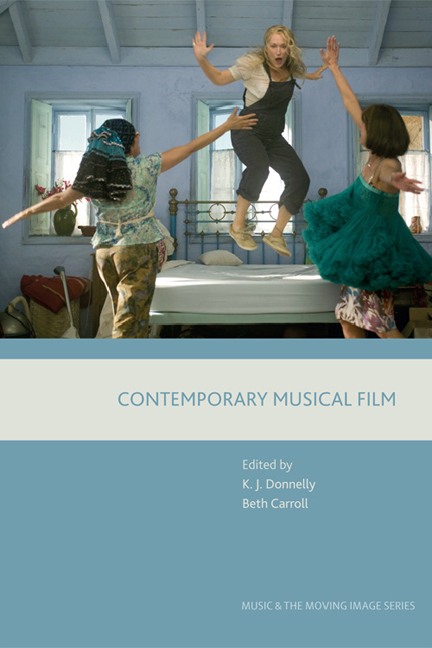Book contents
- Frontmatter
- Contents
- Illustrations
- Contributors
- Introduction: Reimagining the Contemporary Musical in the Twenty-first Century
- PART ONE ORIGINAL MUSICALS
- 1 Aesthetic Absurdities in Takashi Miike's The Happiness of the Katakuris
- 2 Film and the Twilight of Rock (Rock is Dead and Film Killed It): Post-millennial Rock Musicals
- 3 Team America: World Police: Duplicitous Voices of the Socio-political Spy Musical
- 4 The Anti-musical or Generic Affinity: Is there Anything Left to Say?
- 5 ‘Is This Real Enough For You?’: Lyrical Articulation of the Beatles' Songs in Across the Universe
- 6 ‘Love Is an Open Door’: Revising and Repeating Disney's Musical Tropes in Frozen
- PART TWO STAGE TO SCREEN
- PART THREE MUSICALS BY ANOTHER NAME
- Index
2 - Film and the Twilight of Rock (Rock is Dead and Film Killed It): Post-millennial Rock Musicals
from PART ONE - ORIGINAL MUSICALS
Published online by Cambridge University Press: 03 January 2018
- Frontmatter
- Contents
- Illustrations
- Contributors
- Introduction: Reimagining the Contemporary Musical in the Twenty-first Century
- PART ONE ORIGINAL MUSICALS
- 1 Aesthetic Absurdities in Takashi Miike's The Happiness of the Katakuris
- 2 Film and the Twilight of Rock (Rock is Dead and Film Killed It): Post-millennial Rock Musicals
- 3 Team America: World Police: Duplicitous Voices of the Socio-political Spy Musical
- 4 The Anti-musical or Generic Affinity: Is there Anything Left to Say?
- 5 ‘Is This Real Enough For You?’: Lyrical Articulation of the Beatles' Songs in Across the Universe
- 6 ‘Love Is an Open Door’: Revising and Repeating Disney's Musical Tropes in Frozen
- PART TWO STAGE TO SCREEN
- PART THREE MUSICALS BY ANOTHER NAME
- Index
Summary
For a number of years, I have been wrestling with the notion of rock music being dead and have eventually reluctantly admitted that it has suffered an ignominious but unspectacular slow fade out. I do not wish to lament, merely to register a significant change that is evident in film and across culture generally. Perhaps the grotesque corpse of rock can be summed up by rock group AC/DC's last tour. Founder member Malcolm Young retired to a nursing home with Alzheimer's disease in 2014 and later in the year drummer Phil Rudd was arrested and found guilty of drug possession and threatening behaviour. They were replaced. In early 2016 singer Brian Johnson withdrew from the band for medical reasons (due to hearing issues), to be replaced on the 2016 world tour by Guns N’ Roses singer Axl Rose. For much of the tour, Rose had his leg in plaster and was confined to a ‘throne’ on casters in the middle of the stage throughout the performances. Little was left of the ‘real’ group and the spectacle was bizarre and confounding in the extreme, but perhaps emblematic of rock music.
This chapter is an attempt to write about films in which I can find few redeeming features. Since the millennium, a number of film musicals have presented a particularly tame and standardised image of rock music. This appears to correspond very directly with the increasingly prominent notion of rock being ‘dead’. Films such as School of Rock (Richard Linklater, 2003), Camp Rock (Mathew Diamond, 2008), and Rock of Ages (Adam Shankman, 2012) depict a world where rock's socially and culturally problematic aspects have been dissipated or assimilated. This chapter investigates how this cycle of films makes a cultural statement on the death and transfiguration of rock music, as well as embodying rock's destiny.
This recent cycle of films appears to mark nails in the coffin of rock. While over the years many journalists have declared rock moribund, scholars have been slow to have an opinion on something that is not easily substantiated. Although rock-style music continues to be produced, it seems to me that the crucial point is the loss of its socio-cultural milieu.
- Type
- Chapter
- Information
- Contemporary Musical Film , pp. 25 - 39Publisher: Edinburgh University PressPrint publication year: 2017

